Progress 2018 -- Making A Difference: Heart in the City
By Rochelle Moore
Published in News on February 23, 2018 11:38 AM
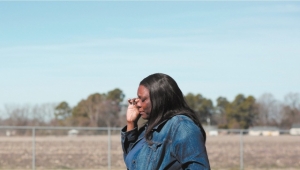
News-Argus/CASEY MOZINGO
Shycole remembers playing as children with her late brother in the backyard of their childhood home.
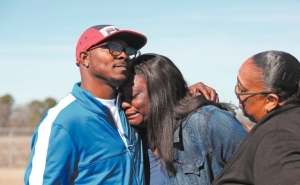
News-Argus/CASEY MOZINGO
Shycole is comforted by her husband, Keyon Carter, and mother as she remembers playing as children with her late brother in the back yard of their childhood home.
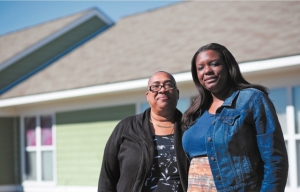
News-Argus/CASEY MOZINGO
Shycole Simpson-Carter poses for a photo with her mother, Beverly Simpson, in front of the apartment they once lived in on McDonald Drive in Mount Olive. The experiences Shycole had while growing up in low-income housing shaped who she is today and her desires to help those in the Goldsboro and Wayne County communities.

News-Argus/CASEY MOZINGO
Shycole answers the phone in her office at Goldsboro City Hall, working to get the word out for the Interfaith Breakfast that she is planning.
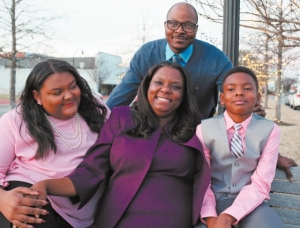
News-Argus/CASEY MOZINGO
Shycole Simpson-Carter poses for a photo with her family in downtown Goldsboro. Clockwise from left, her daughter Rayona Olliver, 17, husband Keyon Carter and nephew Micah Lesesene, 11.
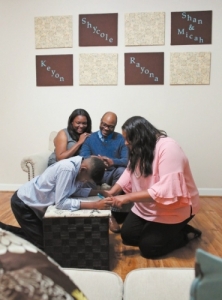
News-Argus/CASEY MOZINGO
Shycole Simpson-Carter spends time with her family at the Goldsboro home. Her daughter Rayona often spends time with her cousin Micah, helping him with homework and playing games.
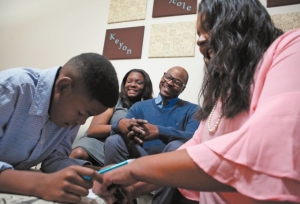
News-Argus/CASEY MOZINGO
Shycole Simpson-Carter spends time with her family at the Goldsboro home. Her daughter Rayona often spends time with her cousin Micah, helping him with homework and playing games.
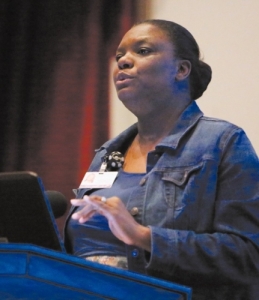
News-Argus/CASEY MOZINGO
Shycole speaks during the opening night of the summer youth employment information session at Wayne Community College earlier this year.
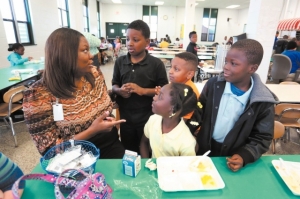
File photo
Shycole Simpson-Carter, left, speaks with fourth-graders Jeremiah Leach, Ja'Kerreyon Keichum, Quran Crawford and Cashmere Faison in the lunchroom at Carver Heights on Friday, November 21, 2014.

File photo
Shycole hugs some of the students from Eastern Wayne High School following their performance at the Martin Luther King Day celebration in 2016.
There are times when Shycole Simpson-Carter returns to the public housing community where she grew up in Mount Olive.
She'll visit the area along McDonald Drive with her daughter, a daughter she's been able to raise in a home with a father, stable income and a future.
Simpson-Carter, the City of Goldsboro's Community Relations director, has shared parts of her story with the community where she serves as a connector between government and people from all walks of life in the city.
She's known for her work in co-organizing the city's summer youth employment program, Our Community Cares fun days at neighborhood parks, helping people with low-income housing needs and working to bridge the gap between people from different ethnic backgrounds.
Sometimes, she's the only person some residents trust.
GROWING UP
IN MOUNT OLIVE
When Shycole was a little girl, her mother would often tell her, her sister and two brothers to get out of public housing and never look back.
"She would do that so much that I thought she didn't want us around," she said. "She used to tell us, 'You get a degree and get out of town.'
"She didn't want us to repeat history. My mom wanted us to break that cycle."
Her mother came from a middle class family but decided to make certain choices that resulted in her becoming a single mother of four children.
"When she got older, she wanted to sow her wild oats," Shycole said. "She didn't have any assistance, and she wasn't working all the time. One of the reasons we truly ended up in public housing was my mother. She said she made the choices she made to have four children by age 24, and she was not going to ask anyone in her family to help her."
As a child, there were many times when food was scarce. Shycole and her siblings wore pants with holes in the knees and they slept on a mattress on the floor. Her mother often stuffed old towels or sheets into the mattress to keep the springs from pushing through.
"We didn't have a car and when we did, it was a two-door Escort," she said. "My mom didn't have a coat until I was in my teens."
When there was food at home, Shycole and her siblings often made meals out of "oodles and noodles" filled with hot dogs or bologna. Shycole's mother also ate very little.
"We never had enough," she said. "What she would do is she would not eat. If you said you were full, she would eat. For many, many years, my mom would eat one meal a day."
Shycole was also exposed to violence in the home, with her mother's boyfriend controlling the environment, restricting when she and her siblings could play outside -- if at all -- and scaring them into having a survival mentality.
"I learned early how to sit back and take a lot and tune it out with him," she said.
There were good moments, though, when Shycole, her brothers and sister would earn an allowance. Her mother gave each a few $1 food stamps.
"We would get up to $2 or $3 stamps and that was our allowance, and we would go to the store and just be happy," she said. "You could buy candy and chips, a little soda."
As a girl, Shycole's dreams were simple.
"I did sit and dream, and it sounds so cliché," she said. "I always remember saying -- whenever we didn't have lights or we all had to get in the same tub, all four of us, because we didn't have water -- 'Our later years are going to be better.'
"My dream was, it's got to be better than this. It's got to be better than this."
SHIFTING GOALS, DREAMS
By the time she reached middle school, her mother's boyfriend was out of the picture, and she started to experience some freedom.
A middle school teacher noticed that she was good with numbers and could solve math problems without taking notes. A coach also saw potential in her height and recruited her to the basketball team. By seventh grade, she was already 6 feet tall.
"They made me play, and I didn't want to play," she said. "I didn't try out."
Being a part of the team and becoming friends with other players helped her learn how to take some of her anger and pain and channel it to succeed.
"They taught me about discipline and how to control myself because even then, I still would snap," she said. "They taught me how to control that anger and pain. They taught me how you bottle it up to improve yourself and not to go back."
She also got the chance to hang out with her teammates and got a glimpse of their home life and what it was like to not live in public housing.
There were other moments when the kindness of teachers and friends, including those who slipped her some money so she could eat during away basketball games, that made a difference in her life.
"They were just really nice to me, the teachers I had and people in the community that knew our situation that took a lot of interest in me because they thought I was really athletic and smart," she said. "They really poured in my life a lot."
Because of her good grades, a civic teacher encouraged her to take accounting and government classes. The decision resulted in her deciding to pursue new goals and dreams.
"That's when I knew I wanted to be an accountant and work in government," she said. "I just wanted to have a better life."
She continued on the basketball team and became a star varsity player. A lot of people thought she'd go on to play ball in college, but a personal setback resulted in a different path.
BREAKING THE CYCLE
Around that time, and after high school graduation in 1997, she started to fear that she might repeat the cycle of poverty, a feeling that drove her to succeed.
She started attending Wayne Community College where she earned an associate's degree in accounting, in 2001.
"I didn't talk to anybody," she said. "I went straight to class and home and studied.
"I felt I had set myself back, that I was not going to get out of public housing. I wasn't going to make it."
She continued to live in public housing while she was in school, and her daughter, Rayona, was born in 2000. Shycole had some health challenges but continued to pursue her goals.
She also worked at the Wayne Action Group for Economic Solvency, WAGES, as a foster grandparent outreach specialist.
In 2004, the door opened up for her to finally leave public housing. She received some money from a wrongful death suit involving her father, who was killed in a vehicle accident. Even though her father didn't have a parental role in her life, she remains connected. She hyphenates her last name to honor him.
"He was the reason why I got out of public housing," she said. "I was able to use that and get out of public housing, and I got my first apartment."
She continued with her education and attended N.C. Wesleyan College where she graduated with two bachelor's degrees -- in business administration and accounting, in 2008.
She continued to work for WAGES but struggled to make ends meet. She never sought any public assistance.
"I felt like if I got any public assistance, I was going to repeat the same cycle as my momma and not get out," she said.
THE WORKING POOR
By 2010, things started to change for Shycole after she was hired to work for the city of Goldsboro as a rehabilitation community development specialist. During the job application process, the former WAGES director paid for her college transcripts, which she needed to verify her degrees. She also didn't receive her bachelor's degrees until she paid the fees.
"I was the working poor before I started working at the city of Goldsboro, and that was in 2010," she said. "When I got my first paycheck, I paid the graduation fee to be able to get my degrees -- two years later -- because I could not afford it."
She and her now husband also struggled to find the money to get married, even though they had been together nearly 10 years. They finally married in 2010.
Shycole continued with her education and earned a master's degree in business administration from Capella University in 2012. She became the community development administrator in 2013 and was promoted to a higher-profile job, as the Goldsboro community relations director, in 2016.
But her success was also met with setbacks, pain and challenges.
ACHIEVING THE DREAM
Around the time when she learned about the promotion, she was going through a difficult time, with the unexpected loss of her brother who died after suffering from an asthma attack.
"He was 32," she said. "This is a kid I gave my food to. That's the sibling I'm the most closest to."
Shycole briefly shared her loss during the recent Dr. Martin Luther King Jr. community luncheon, saying when her brother was struggling during the asthma attack, there were emergency workers from different racial backgrounds all working hard to save him. It was an example of how important unity is in Goldsboro and Wayne County, she said.
In her daily work, many times with people struggling in poverty, she works to offer help and hope. She also believes -- without a doubt -- that rising out of poverty is possible.
She believes her experiences can offer others hope.
"I know what poverty is like," she said. "I am a true living example. If you want to get out of poverty, you can get out of poverty."
During the past two years as Goldsboro's community relations director, she has worked hard to meet the needs of people in the community, even when she was facing her own challenges.
In 2017, she was diagnosed with early stage kidney failure and continued to work in between her doctor visits and need for rest.
"I knew there were a lot of people that depended on me," she said. "I know there's a lot of people that do not feel comfortable talking to anyone else at the city. I knew that if I was down, nursing myself, they weren't going to have somebody that they could call to help them."
It was during that time that she collaborated with community partners in the creation of the city of Goldsboro's summer youth job program, which attracted hundreds of interested teens in its first year.
She works long hours, sometimes through the weekend and always tries to be available to people in the community. She enjoys the freedom in making a difference.
"When you grow up not having control to be able to do things and feeling like you never will do anything, when you get to the point where you've got that freedom, it runs with you," she said.
Her work includes administering grants provided through the U.S. Department of Housing and Urban Development, the N.C. Housing Finance Agency and the Community Development Block Grant program. She helps secure grants to help people find affordable housing or make housing repairs, and she works with landlords to help people avoid eviction. Her office also finances the needs of a local food truck, and she finds ways to help children who are hungry or in need of clothing.
She also organizes large-scale events, including the annual Dr. Martin Luther King Jr. banquet, the Interfaith Breakfast and the Human Relations banquet and directs the Goldsboro Mayor's Youth Council.
OFFERING HOPE
It wasn't too long ago that she was offered a job that would have provided her with a promotion and a substantial pay increase outside of Wayne County. She considered the job but ended up turning it down.
"I just thought about the people I serve and I just couldn't go," she said. "I stay here because I care."
"My pain is why I am so committed here at the city of Goldsboro. My pain and suffering is why I can sympathize and empathize with the most disenfranchised people in our community. My pain and suffering is why I work like I do, coming in here at 6:30 a.m. and leaving at 7 p.m. and working almost every weekend to help somebody because I know what it's like to not have hope.
"There were many times I didn't have that and I want to give that to people. Somebody helped me when I couldn't help myself, and I've got to do the same thing."
